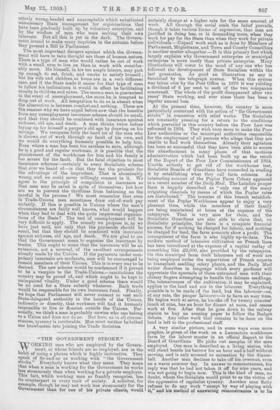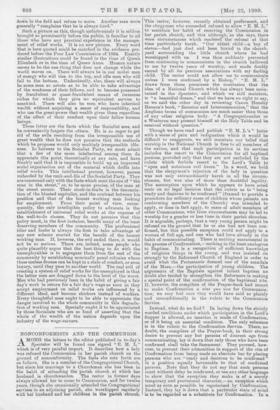"THE GOVERNMENT STROKE."
WORKING men who are employed by the Govern- ment, or whose friends are so employed, are in the habit of using a phrase which is highly instructive. They speak of So-and-so as working with "the Government stroke." Everybody knows what they mean. They mean that when a man is working for the Government he works less strenuously than when working for a private employer. This fact, which working men so frankly recognise, has its counterpart in every rank of society. A solicitor, for example, though he may not work less strenuously for the Government than for one of his private clients, would certainly .charge at a higher rate for the same amount of work. All through the social scale the belief prevails, though it takes various forms of expression, that men are justified in doing less, or iii demanding more, when they work for pay for the State than when they work for private individuals.—Unpaid work such as is done by Members of Parliament, Magistrates, and Town and County Councillors is another matter altogether.—It is this primary fact which largely explains why Government enterprise or municipal enterprise is more costly than private enterprise. Many illustrations will occur to the mind of any one who has followed the development of State Socialism within the last generation. As good an illustration as any is furnished by the telegraph system. When this system was taken over by the Post Office in 1870 it was yielding a dividend of 6 per cent, to each of the two companies concerned. The whole of the profit disappeared after two years' State working, and ever since there has been regular annual loss. .
At the present time, however, the country is more particularly concerned with the action of "the Government stroke" in connexion with relief works. The Socialists are constantly pressing for a return to the conditions which prevailed in this country before the Poor Law was reformed in 1834. They wish once more to make the Poor Law authorities or the municipal authorities responsible for the employment of all persons who allege that they are unable to find work themselves. Already their agitation has been so successful that they have been able to secure the abandontneet in many places of that cautious administration which had been built up as the result of the Report of the Poor Law Commissioners of 1834. Unable entirely to get rid of the workhouse test, Socialistic Boards of Guardians have succeeded in evading it by establishing what they call farm colonies. An interesting account of the Poplar Farm Colony appeared in a recent number of the Daily Mail. The Laindon pauper farm is happily described as "only one of the many irrigating channels by means of which the Poplar rates are distributed." The inmates of this branch establish- ment of the Poplar Workhouse appear to enjoy' a very pleasant time, while the members of their family are being Maintained at home at the expense of the ratepayers. That is very nice for them, and the Socialistic Guardians are also able to claim that, on Socialistic principles, the farm is a complete financial success, for if nothing be charged for labour, and nothing be charged for land, the farm accounts show a profit. The management of the farm is also highly up-to-date. The modern method of intensive cilltivation on French lines has been introduced at the expense of a capital outlay of something like .22,000, also provided by the ratepayers.. On this municipal farm dock labourers out of work are being employed under the supervision of French experts to transplant seedling celery plants, and the Daily Mail writer describes in language which every gardener will appreciate the spectacle of those untrained men with their clumsy fingers attempting to handle the delicate seedlings. The intensiveness of the cultivation, it may be explained, applies to the land and not to the labourer. Everything possible is to be made cf the land, but the labourer—or, at any rate, the pauper labourer—is to have an easy time. He begins work at seven, he kuccks off for twenty minutes' lunch at nine, has an hour for dinner at noon, and ceases work at five. After that he goes down to the railway station to buy an evening paper to follow the Budget debate. Any other work that remains to be done on the land is left to the professional staff.
A very similar picture, and in some ways even more graphic, is given of the work on a Lancashire workhouse farm by the labour master in an official Report to the Board of Guardians. He picks out samples of the men employed. One man is described as a living statue, who will stand beside his barrow for an hour and a half without moving, and is only aroused to animation by the dinner- bell. Another man declines to take off his overcoat, even on a warm summer day. In answer to remonstrances, his reply was that lie had not taken it off for nine years, and was not going to begin now. This is the kind of man, no doubt, whom the Socialists would point to as the victim of the oppression of capitalist tyranny. Another mau flatly refuses to do any work "except by way of playing with It," zed his method of answering remonstrances is to lie down in the field and refuse to move. Another 'man more generally "complains that he is always tired."
Such a picture as this, though unfortunately it is seldom brought so proniinently before the public, is familiar to all those who have any practical experience in the manage- inent of relief works. It is no new picture. Every word that is here quoted could be matched in the evidence pro- duced before the Poor Law Commission of 1884. Exactly similar illustrations could be found in the time of Queen Elizabeth or in the time of Queen Anne. Human nature seems to be the one thing that does not change while the world moves on. There will always be in our midst men of energy who will rise to the top, and idle men who will fall to the bottom. Undoubtedly, also, there will always be some men so astute as to be able to take .advantage of the weakness of their fellows, and to become possessed by fraudulent or quasi-fraudulent means of immense riches for which they give no equivalent service to mankind. There will also be men who have inherited wealth without acquiring a sense of responsibility, and who use the great power that wealth gives them regardless of the effect of their conduct upon their fellow human beings.
These latter are the facts which the Socialist sees, and he conveniently forgets the others.. He is so eager to get rid of the evils resulting from the irresponsible use of great wealth that he does not perceive that the methods which he proposes would only multiply irresponsible idle- ness. In fairness to the Socialist Party, we must admit that a few of the more intellectual among them do appreciate this point, theoretically at any rate, and have frankly said that it is impossible to build up an improved social organisation out of the material which drifts into relief works. This intellectual protest, however, passes unheeded by the rank-and-file of the Socialist Party. They are concerned only with the facts which meet the eye of "the man in the street," Or, to be more precise, of the man at the street corner. Their stock-in-trade is the denuncia- tion of the bloated capitalist, and the contrast between his position and that of the honest working man looking for employment. From their point of view, conse- quently, the only intelligible policy to advocate is the establishment of universal relief works at the expense of the well-to-do classes. They do not perceive that this policy must, in the first instance, benefit many of the least deserving members of the community. The professional idler and loafer is always the first to take advantage of any new scheme started for the benefit of the honest working man. If, however, the evil ended there, it, would not be so serious. There are, indeed, some people who quite plausibly argue that the best thing to do with the unemployables is to segregate them from the rest of the community by establishing nominally penal colonies where these useless drones can be kept in a state of comfort, or even luxury, until they pass to another world. The real evil of creating a system of relief works for the unemployed is that the better men are dragged down to the level of the worst. Men who had previously been in the habit of giving a fair day's work in return for a fair day's wage as soon as they accept employment on relief works are influenced by a different ideal, and become shirkers instead of workers. Every thoughtful man ought to be able to appreciate the danger involved to the whole community in this degrada- tion of working men. Specially ought it to be appreciated. by those Socialists who are so fond of asserting that the whole of the wealth of the nation depends upon the industry of the wage-earners.











































 Previous page
Previous page